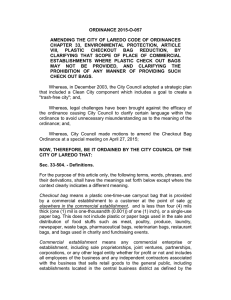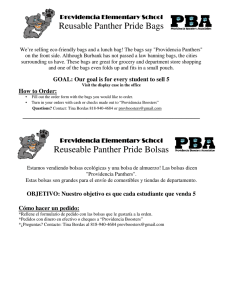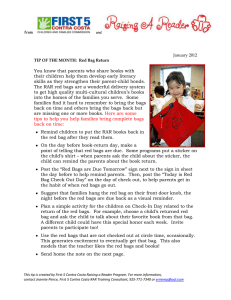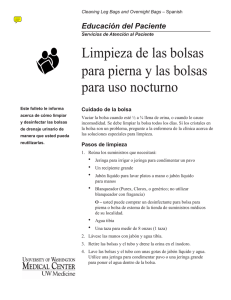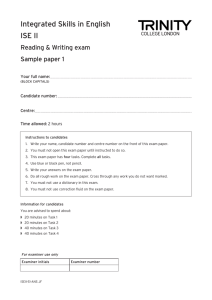Checkout Bags Ordinance Factsheet and
Anuncio
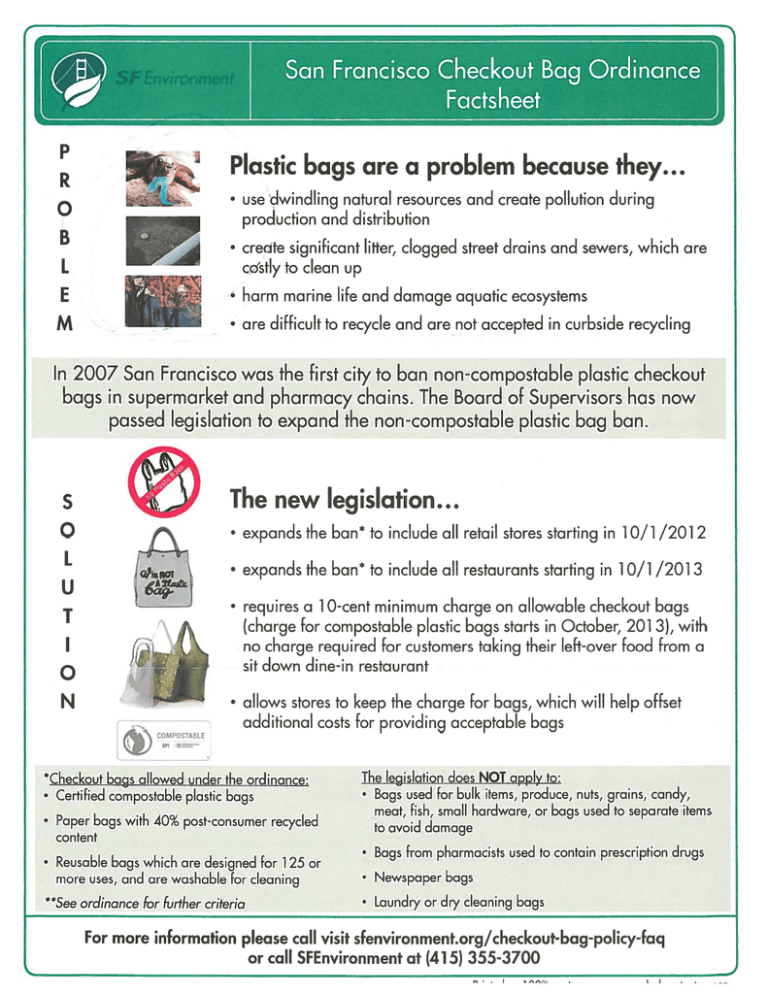
San Francisco Checkout Bag Ordinance Factsheet p R 0 B Plastic bags are a problem because they... - I • use dwindling natural resources and create pollution during production and distribution create significant litler, clogged street drains and sewers, which are costly to clean up harm marine life and damage aquatic ecosystems are difficult to recycle and are not accepted in curbside recycling In 2007 San Francisco was the first cily to ban non-compostable plastic checkout bags in supermarket and pharmacy chains. The Board of Supervisors has now passed legislation to expand the non-compostable plastic bag ban. s The new legislation... expands the ban* to include all retail stores starting in 1 0/1/201 2 0 I U T expands the ban* to include all restaurants starting in 1 0/1/201 3 • requires a 1 0-cent minimum charge on allowable checkout bags (charge for compostable plastic bags starts in October, 201 3), with no charge required for customers taking their left-over food from a sit down dine-in restaurant 0 N • allows stores to keep the charge for bags, which will help offset additional costs for providing acceptable bags COMPOSTABLE *Checkout bags allowed under the ordinance: • Certified compostable plastic bags • Paper bags with 40% post-consumer recycled content • Reusable bags which are designed for 1 25 or more uses, and are washable for cleaning **See ordinance for further criteria The legislation does NOT appiy to: • Bags used for bulk items, produce, nuts, grains, candy, meat, fish, small hardware, or bags used to separate items to avoid damage • Bags from pharmacists used to contain prescription drugs • Newspaper bags • Laundry or dry cleaning bags For more information please call visit sfenvironment.org/checkout-bag-policy-faq or call SFEnvironment at (415) 355-3700 Frequently Asked Questions Checkout Bag Ordinance What is the purpose of the legislation? The purpose of this new law is to encourage customers to bring their own checkout bags, in order to reduce the impact to the city and the environment of disposable bags. At least 45 other cities and counties in California have similar laws. Charging customers 10 cents per provided checkout bag has been shown to reduce the number of disposable bags used, by nearly 70-90%. This reduction in bag use also saves stores in their own checkout bag purchase costs. This legislation will also help reduce unnecessary waste, contamination in recycling and composting programs, and litter, all of which is very costly to the taxpayers of San Francisco, as well as prevent harm to marine life. What types of businesses does the legislation apply to? This legislation applies to all retail establishments located within the geographical limits of the City and County of San Francisco, including convenience stores. The legislation also applies to restaurants starting October 1, 2013. Are businesses required to charge? Yes. The minimum charge is 10 cents per checkout bag, but if a business wants to charge more for the bags they give out they can. When does the legislation go into effect? Stores must charge for checkout bags starting October 1 st, 2012. Due to state regulations, cornpostable plastic bags don’t 5t, 2013, however, businesses may choose to charge for compostable plastic bags carry a required charge until October 1 st, 2013. before then. Restaurants are not subject to the legislation until October 1 How will the legislation affect the poor and elderly in San Francisco? Stores pass the cost of bags onto their shoppers. Low-income people and seniors will be able to avoid all bag costs by bringing their own bags to the store. SF Environment will partner with grocers and local non-profit environmental groups in a public awareness campaign promoting reusable bags, including reusable bag giveaways targeting low and fixed-income San Franciscans. Customers participating in WIC or food stamp programs are exempt from the bag charge. Where will the money be spent? Stores keep the entire checkout bag charge in order to offset the cost of allowable bags. How can shoppers avoid the charge? Shoppers can avoid the charge by bringing their own bags whenever they shop, or refuse a bag when they make a small purchase that is easy to carry without a bag. How will the fee be monitored? The checkout bag charge must be itemized and shown separately on the customer’s receipt. What happens to businesses that don’t comply? SF Environment will focus primarily on education and helping businesses comply. For those who are persistently out of compliance, warning can be issued, and fines can range from $1 00-$500. Where can I buy acceptable bags? Acceptable bags come in a wide variety of shapes and sizes. Ordinance compliant bags are available at a variety of price points. SFE will provide lists of ordinance-compliant bag suppliers. For more information please call visit sfenvironment.org/checkout-bag-policy-faq or call SFEnvironment at (415) 355-3700 C0Wv • SF Environment Our home. Our city. Our planet. EDWIN M. LEE Mayor MELANIE NUTTER Director Attention All Retail Business Owners and Managers ST 1 NEW LEGISLATION TAKES EFFECT ON OCTOBER 2012 The City and County of San Francisco recently approved a new law, amending Chapter 17 of the Environment Code, extending the plastic checkout bag ban to include all retail establishments (stores) and adding a charge on allowed checkout bags. Effective October 1st, 2012, the new Checkout Bag Ordinance, #33-12, requires that: no store shall provide a plastic checkout bag to a customer. Stores that provide a customer with an allowed checkout bag must charge at least ten cents ($0.10) per bag. Stores will only be allowed to provide to customers checkout bags that are: certified compostable plastic, recyclable paper with 40% post-consumer recycled content, or reusable designed for at least 125 uses. Allowed checkout bags also have other requirements such as specific labeling that are defined in the Ordinance. Stores do not have to charge for certified compostable plastic bags until October, 2013. Stores keep the 10 cent charge, which can help stores offset the cost of allowed bags. Customers participating in WIC or food stamp programs are exempt from all bag charges. To help your store comply with this Checkout Bag Ordinance, the SF Department of the Environment will host 5 free bag vendor fairs listed below. This is a great opportunity to meet bag suppliers and see examples of acceptable recyclable, compostable, and reusable checkout bag options. Attendance to one of the fairs is highly recommended as city staff will be available to answer questions. The first 100 business owners/managers to sign in at each fair event will be eligible to receive 25 reusable high quality cloth bags (maximum per business) to give to their select customers, courtesy of the Department of the Environment. Bag Fair Events for Stores: th • June 19 (9:30am 11:00am) th • June 26 (9:30am 11:00am) th 10 • July (9:30am 11:00am) th 17 • July (2:00pm 3:30pm) th 24 • July (9:30am 11:00am) — — — — — Chinatown YMCA, 855 Sacramento Street th Women’s Building, 3543 18 Street Bayview Opera House, 4705 Third Street Minnie @ Lovie Ward Recreation Center, 650 Capitol Ave th Golden Gate Park @ County Fair Building, 1199 9 Ave Enclosed with this letter you’ll find a Checkout Bag Ordinance Factsheet and FAQ as well as signage for the checkout area of your shop. To find out more about the Checkout Bag Ordinance, and acceptable bags for distribution, please visit: SFEnvironment.org/checkout-bag-policy-faq or call (415) 355-3700. Department of the Environment, City and County of San Francisco 11 Grove Street, San Francisco, CA 94102 Telephone: (415) 355-3700 • Fax: (415) 554-6393 Email environrrient@sfgov org • www sfenvironment org 100% Post Consumer Recycled SFEnvronment ‘ Our home. Our city. Our phmel. EDWIN M. LEE Alcalde MELANIE NUTTER Directora Atención a todos los comercios minoristas Propietarios y Encargados LA NUEVA LEGISLACION ENTRARA EN VIGENCIA EL 1 DE OCTUBRE DE 2012 La Ciudad y el Condado de San Francisco aprobaron una nueva ley, que enmienda el CapItulo 17 del Código Medioambiental, para extender Ia prohibición de Ia entrega de bolsas plásticas para compras y que incluya a todos los establecimientos de yenta minorista (tiendas) y añada un cargo sobre las bolsas permitidas. En vigencia a partir del 1 de octubre de 2012, Ia nueva Ordenanza de Bolsas para Compras, #33-12, exige que: ninguna tienda entregue bolsas plàsticas para compras a sus clientes. Las tiendas que le ofrezcan al cliente una bolsa para compras permitida deberán cobrar al menos diez centavos ($0.10) por bolsa. Las tiendas ünicamente podrán entregarles a los clientes bolsas para compras que sean de: plástico biodegradable certificado, papel reciclado con 40% de contenido postconsumo o de un diseño reusable que dure al menos para 125 usos. Las bolsas para compras permitidas tamblén cuentan con otros requisitos, como un etiquetado especifico, que serán definidos en Ia Ordenanza. Las tiendas no deberán cobrar por las bolsas de plástico biodegradable certificado hasta octubre de 2013. Las tiendas conservarán el pago de 10 centavos, que les ayudará contrarrestar el costo de las bolsas permitidas. Los clientes que participen en WIC o programas de cupones para alimentos están exentos de todo cargo por las bolsas. Para ayudar a las tiendas a cumplir esta Ordenanza de Bolsas para Compras, el Departamento de Medioambiente de San Francisco realizará cinco ferias de proveedores gratuitas que figuran a continuación. Esta es una gran oportunidad para conocer proveedores de bolsas y ver ejemplos de opciones reciclables, biodegradables y reusables aceptables. Se recomienda Ia asistencia a Ia feria ya que el personal del municipio va a estar disponible para responder a sus preguntas. Los primeros 100 propietarios/encargados de tiendas que se inscriban en cada feria serán elegibles para recibir 25 bolsas de tela de maxima calidad reusables (máximo por tienda) para dárselas a sus clientes favoritos, cortesIa del Departamento de Medioambiente. Ferias de Bolsas para Tiendas: th 19 • June (9:30am 11:00am) th 26 • June (9:30am 11:00am) lO • July (9:30am 11:00am) th 17 • July (2:00pm 3:30pm) th • July24 (9:30am 11:00am) — — — — — Chinatown YMCA, 855 Sacramento Street th 18 Women’s Building, 3543 Street Bayview Opera House, 4705 Third Street Minnie @ Lovie Ward Recreation Center, 650 Capitol Ave th Golden Gate Park @ County Fair Building, 1199 9 Ave . . Adjunta con esta carla encontrará una Hoja Informativa y Preguntas Irecuentes sobre Ia Ordenanza de Bolsas para Compras, como asItambién Ia seiialización para el area de Ia caja de su tienda. Para conocer más sobre Ia Ordenanza de Bolsas para Compras y las bolsas que puede utilizar, visite: SFEnvironment.org/checkout-bag-policy-faq o Ilame al (415) 355-3700. uu 2012+—, () 5j ($0.10) ê#3312j: fl40%c1HiF014kQ lIT, i’4Ii, J IH-) 4 TLi2013 0 T11254iJ iIJ , W(’JO 43: fi :Iffl (4) • • • • • June (9:30am 11:00am) Chinatown YMCA, 855 Sacramento Street th 26 th 18 June (9:30am 11:00am) Women’s Building, 3543 Street th 10 July (9:30am 11:00am) Bayview Opera House, 4705 Third Street July (2:00pm 3:30pm) Minnie @ Lovie Ward Recreation Center, 650 Capitol Ave th July24 (9:30am 11:00am) Golden Gate Park @ County Fair Building, 1199 9 Ave IJi1t± — — — — — -, SFEnvironment.org/checkout-bag-poIicy-faqI& (415) 355-3700 Departamento de Medioambiente, Ciudad y Condado de San Francisco 11 Grove Street, San Francisco, CA 94102 Teléfono: (415) 355-3700 • Fax: (415) 554-6393 Correo electronlco environment©sfgov org • sfenvlronment org Impresoenpapel
